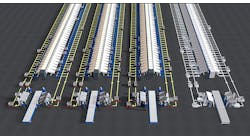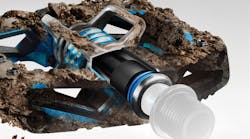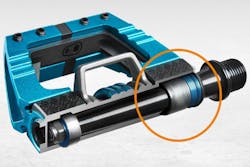Robin Wallner has ridden various types of bikes for 25 years. The Swedish cyclist, now 32, started racing competitively when he was just 10 years old and is now a highly-ranked rider on the Enduro World Series circuit. He is the captain of the mountain biking team for ibis, one of the world’s top manufacturers of mountain bikes. His bike, the ibis Ripmo, has been heralded as “the perfect mountain bike.”
Highly-decorated mountain bike riders such as Wallner are acutely aware of the sophisticated components that are included on his equipment. Like skiers, golfers, and other athletes who depend on highly technical equipment, cyclists can feel subtle differences. A slight change on a bike might go unnoticed by a recreational rider, but gifted athletes such as Wallner can detect the most minute adjustment.
When he learned that the bushings on his bike were being changed from steel to plastic, he had understandable reservations. “I had some concerns that plastic wasn’t going to hold up against the forces that we put on our bikes,’’ said Wallner, who won the 2012 World Downhill Series before switching over to Enduro racing. “I wasn’t sure how it would withstand the abuse of dirt, water, and other bike path debris.”
While a rational thought, Wallner, other professionals, and even weekend warriors have discovered that highly technical, engineered plastics stand up to the rigors associated with a sport that generates great stress on equipment. igus, the Germany-based manufacturer of motion plastics, is helping to revolutionize the change from steel to lower-cost plastic components in the mountain biking industry.
Since switching to igus bushings, Wallner has found that his Ripmo V2 bike withstands the pounding of the demanding mountain bike terrain. “In over two years of riding, our Enduro Team hasn’t broken any bushings,’’ Wallner said. “It has definitely been holding together better than I originally thought. It’s also lighter and much easier to maintain than the bushings I previously used.”
Multiple Advantages
A slew of industries have found advantages in using highly technical plastic components. Powerful cranes, swift-moving roller-coasters, robots, packaging machines, medical devices, and material handling equipment all include sophisticated plastics technology.
The same advantages for those applications are also beneficial in mountain bikes. The dry-running, lightweight, and durable properties make igus products suitable for many mechanical tasks–including mountain bikes.
Crankbrothers, a California manufacturer of an array of mountain bike products, has been using plastic materials since 2015. igus bushings are included in several models of pedals and are also included in the company’s Highline dropper seat posts, which allow riders to adjust their seats quickly and easily as they adapt to variable terrain.
“We see the benefits of igus parts, especially since the bikes are put through some harsh conditions and contamination where metal parts break down faster and can cause failures, where plastics generally don’t,’’ said Megan Tompkins, the global marketing director at Crankbrothers, which also manufactures wheels, handlebars, and pumps for mountain bikes. “I can see more and more manufacturers switching to plastic components now that the industry is seeing the benefits.”
Crankbrothers had been using needle bearings or Delrin bushings (a thermoplastic designed to replace metal) and brass keys in its products. “We experienced some corrosion,’’ said Tompkins, who became aware of igus through trade shows and industry research. “We were also trying to solve issues with durability and precision fits.”
“After the first year when the new frames that featured igus were on the market, I started receiving feedback from consumers who had taken their frames apart for maintenance,’’ said Colin Hughes, lead engineer for ibis. “I got a few from the United Kingdom where the owners were shocked by how well they are holding up.”
ibis, founded in 1981, manufactures bikes and components, and it uses igus bushing in its full-suspension frames. The bushings are in the bike’s clevis, a U-shaped connector fastened by a bolt or pin passing through the ends of the connector.
“We had always used sealed cartridge ball bearings in all of our pivots,’’ Hughes said. “It was what the customer always wanted, but some of our highest load pivots moved less than 20 degrees. It did not seem to matter how high the quality of a ball bearing I specified. It would always start feeling notchy prematurely.”
Matt Floyd of igus, the company’s West Coast regional sales manager, said igus has seen significant growth since it introduced plastic components to industry manufacturers in 2012. “The contamination and wear with metal made it challenging for the mountain biking industry,’’ Floyd said. “It also created unnecessary weight and accelerated wear and friction. We were able to reduce costs without affecting performance and feel.”
Growing Industry
For many businesses, the COVID-19 pandemic proved financially devastating. The bicycle market was not among them.
Bicycle sales rose 75 percent in April, reaching more than $1 billion in a single month for the first time ever, according to The NPD Group. Sales of mountain bikes were up 150 percent in April.
The number of riders pursuing mountain biking as a recreational activity has grown substantially in the past decade. In 2011, nearly 7 million people participated in the activity, according to Statista.com. That number rose to more than 8.6 million in 2019. The global mountain bike market is expected to grow at a compound annual growth rate of 9.84 percent from 2017-2021.
The sport’s popularity also extends around the globe. While the U.S. leads the way, there are nearly 4 million participants in Germany, 1.3 million in Canada, and as many as 5.5 million in the United Kingdom.
The engineering behind improved mountain bike technology is developed through racing teams. Just as many improvements in automobiles have been developed through NASCAR and Indy-style racing, the same theory stands behind mountain biking developments. Wallner said the engineered plastics have helped his bike become lighter, stiffer, and more cost-effective.
While Wallner is world-ranked, the slight equipment changes that helped improve his bike will also appeal to the millions of recreational cyclists who rush down rugged mountain terrain. “All mountain biking technology is developed with racing, but the majority of the technology is used by recreation cyclists,’’ Floyd said. “Everything is developed with speed in mind.”
Prices for mountain bikes run upwards of $1,000, with some pricier models selling for more than $10,000. Some riders even design their own bike, selecting frames, wheels, suspension, seating, pedals, and more.
What most riders seek through their bike, however, is lightweight, durability, and comfort. A lighter bike is easier to maneuver and incurs less stress than heavier models. The rugged terrain places significant stress on the bike and rider, and components have to stand up to dirt, mud, rocks, and sticks. The thrill is in crafting a ride that is simultaneously challenging, durable, thrilling, and safe.
With that in mind, the day seems to be near when nearly all mountain bikes will include some engineered plastic components. The advantages are too numerous.
“We know how critical the feel and fit can be for riders,’’ Floyd said. “We take pride in our attention to detail in designing and testing tolerances for fit and performance and make sure the standards are met for each application. We want every rider to find as much enjoyment as they can out of the sport.”
Nicole Lang is the iglide national product manager for igus North America.











